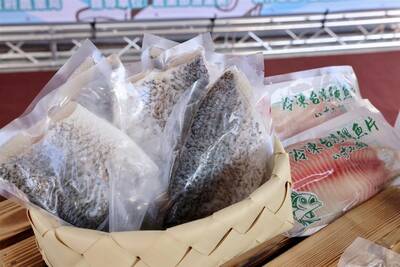Three Chinese Nationalist Party (KMT) lawmakers yesterday proposed an amendment to allow for the observance of “natural disaster leave” to give workers the right not to go to work during a natural disaster if it would put their lives in danger.
The amendment to Article 40-1 of the Labor Standards Act (勞動基準法) seeks to better protect the lives and safety of workers, as some companies have asked employees to go to work amid natural disasters, KMT legislators Yu Hao (游顥), Huang Chien-pin (黃建賓) and Niu Hsu-ting (牛煦庭) told a news conference in Taipei.
Taiwan is in an earthquake-prone zone and is affected by climate change, and road access is often disrupted due to devastation caused by natural disasters, Yu said.

Photo: Fang Pin-chao, Taipei Times
Although local governments have the authority to suspend work and school during natural disasters and typically announce such decisions early to give people time to respond, the Labor Standards Act (勞動基準法) does not have clear rules on “natural disaster leave,” he said.
As such, many food courier service operators continue to ask their employees to risk their lives to deliver food during typhoons, he said, adding that such demands contradict Article 15 of the Constitution, which guarantees people “the right of existence, the right of work and the right of property.”
The legislators would propose the amendment to legalize the observance of natural disaster leave after hearing opinions from all relevant parties, Yu said.
Huang said that the only legal basis for the government to cancel work due to a natural disaster is under the Guidelines for Workers’ Attendance Management and Wages in Institutions Affected by Natural Disasters (天然災害發生事業單位勞工出勤管理及工資給付要點), which states that workers can choose not to work on official typhoon days and employers are banned from treating it as an absence without leave, but there is no punishment for employers who contravene the rules.
The legal basis for natural disaster leave should be stated more clearly in the law, and such an amendment should be quickly introduced to safeguard workers’ health and safety, Huang said.
The act states that employers have the right to ask their workers to continue coming to work when the nation is affected by a natural disaster or an emergency, but workers themselves must often bear the risks and costs of commuting to work in those situations, Niu said.
When workers request compensatory leave for working on a typhoon day, they are often told that they should not travel too far from their workplace in case there is a work-related emergency, he said.
“The amendment would require employers to pay for all the costs workers incur when they are recalled back to work, including costs of commuting and losses they sustained on the way,” Niu said. “Workers should have the right not to go to work if doing so threatens their personal safety.”

Taiwan's Vice President Hsiao Bi-khim (蕭美琴) said Saturday that she would not be intimidated by the Chinese Communist Party (CCP), following reports that Chinese agents planned to ram her car during a visit to the Czech Republic last year. "I had a great visit to Prague & thank the Czech authorities for their hospitality & ensuring my safety," Hsiao said on social media platform X. "The CCP's unlawful activities will NOT intimidate me from voicing Taiwan's interests in the international community," she wrote. Hsiao visited the Czech Republic on March 18 last year as vice president-elect and met with Czech Senate leadership, including

There have been clear signs of Chinese Communist Party (CCP) attempts to interfere in the nationwide recall vote on July 26 in support of Chinese Nationalist Party (KMT) legislators facing recall, an unnamed government official said, warning about possible further actions. The CCP is actively involved in Taiwanese politics, and interference in the recall vote is to be expected, with multiple Chinese state media and TAO attempts to discredit the Democratic Progressive Party (DPP) and undermine public support of their recall movement, the official said. This interference includes a smear campaign initiated this month by a pro-Beijing Hong Kong news outlet against

A week-long exhibition on modern Tibetan history and the Dalai Lama’s global advocacy opened yesterday in Taipei, featuring quotes and artworks highlighting human rights and China’s ongoing repression of Tibetans, Hong Kongers and Uighurs. The exhibition, the first organized by the Human Rights Network for Tibet and Taiwan (HRNTT), is titled “From the Snowy Ridges to the Ocean of Wisdom.” “It would be impossible for Tibetans inside Tibet to hold an exhibition like this — we can do it. because we live in a free and democratic country,” HRNTT secretary-general Tashi Tsering said. Tashi Tsering, a Taiwan-based Tibetan who has never

A first shipment of five tons of Taiwan tilapia was sent from Tainan to Singapore on Wednesday, following an order valued at NT$600,000 (US$20,500) placed with a company in the city. The products, including frozen whole fish and pre- cooked fish belly, were dispatched from Jiangjun Fishing Harbor, where a new aquatic processing and logistics center is under construction. At the launch, Tainan Mayor Huang Wei-che (黃偉哲) called the move a “breakthrough,” marking Taiwan’s expansion into the Singaporean tilapia market. Taiwan’s tilapia exports have traditionally focused on the United States, Canada, and the Middle East, Huang said, adding that the new foothold in